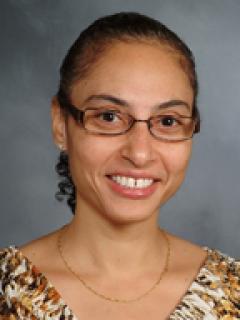Dr. Francine Garrett-Bakelman, an Instructor in Medicine in the Division of Hematology and Medical Oncology, was invited by NASA to speak on "Medical Genomics." On February 11, 2016, she delivered a talk at the Universities Space Research Association, Lunar and Planetary Institute, in Houston, Texas, reporting on medical genomic technologies, applications, and their integration into clinical care.

Dr. Francine Garrett-Bakelman
Dr. Garrett-Bakelman's talk was held as part of NASA's "Friday Science Program," a program for which NASA invites experts in their field to present topics of current interest to the NASA research and medical communities. In her talk, she reviewed the rapid development in scientific techniques applicable to genetic sequencing and the resulting rapid accumulation of genetic data worldwide from human subjects with and without known diseases. Dr. Garrett-Bakelman's report covered methodologies used in research and clinical applications and specific examples in which discoveries in omics studies have led to the development of targeted treatments.
As a physician-scientist in Dr. Ari Melnick's laboratory, Dr. Garrett-Bakelman is focused on epigenetic gene regulation in myeloid disorders in the elderly, and the development of novel, more effective therapies. She is the recipient of an NIH K08 grant and a joint Robert Wood Johnson/American Society of Hematology (ASH-AMFDP) career development awards. Dr. Garrett-Bakelman has also been working with NASA on the "Twins Study" in collaboration with Dr. Christopher Mason, Department of Physiology and Biophysics, Cornell University since 2014. Their project is focused on the landscape of DNA and RNA methylation (epitranscriptome) and how gene expression is affected by space travel. They are also working in collaboration with the Twins Study Working group members to further understand how space travels affect human genetics and epigenetics. Dr. Garrett-Bakelman just returned from a trip to the Johnson Space Center in Houston, Texas, where she processed the first post-flight samples collected as part of the study. She describes her involvement in the project as a "once in a life-time opportunity and a dream come true for a space science enthusiast. It is an opportunity to contribute to scientific knowledge that is helping to plan for long-term human space travel in the future. It is truly an honor to be part of this unique project."

